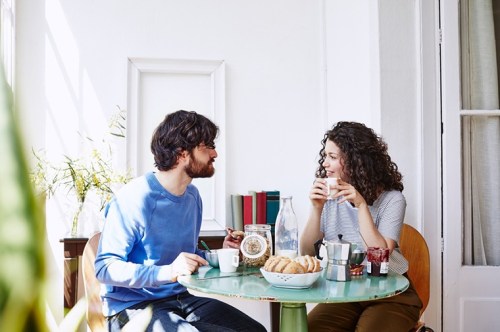Our editors independently select these products. Making a purchase through our links may earn Well+Good a commission
Are open relationships the healthiest kind?
Considering keeping your options open while dating? Here are the pros and cons of polyamorous partnerships, according to sex and relationship experts.

Open marriages. Monogamish. Throuple-ing up. Whatever you call it, as more people look for ways to keep their long-term relationships exciting, plenty are questioning whether polyamorous partnerings are the way to do it. And the debate’s not just happening behind closed bedroom doors.
Multiple TV shows (House of Cards, Girls, Orphan Black, Transparent, The Magicians) are now exploring the subject, the topic made the cover of the New York Times Magazine, and there’s enough interest IRL that new apps are being designed to help users organize threesomes. In other words, the idea of being romantically entangled with more than one person’s never been trendier—or easier. But is it healthier?
“I don’t think there’s anything more emotionally unhealthy than living inauthentically,” says Jenny Block, author of Open: Love, Sex, and Life in an Open Marriage. She recalls that she felt mentally and physically drained before coming clean to her husband about not wanting to be monogamist anymore. (Block was also having an extramarital affair at the time, which added to the anxiety.) The couple went on to have a successful, non-exclusive marriage for eight years. “It’s not that I think open relationships are healthier,” she explains. “I think being in a [situation] that really works for you is healthier, and the two are intrinsically connected.”
“It’s not that I think open relationships are healthier. I think being in a [situation] that really works for you is healthier, and the two are intrinsically connected.”
The way people live today is causing many, like Block, to question the status quo when it comes to sex and dating. According to Elisabeth Sheff, PhD, author of The Polyamorists Nextdoor, open relationships (which can mean anything from flirting to sex to love with someone other than your primary partner, depending on how you define it) are becoming more common. Why? There are a few contributing factors, including longer lifespans, easily accessible birth control, technology connecting people to more potential partners, and women’s financial independence, she says. But whether or not you’ll benefit from being in one depends on your individual needs—as well as those of your partner(s).
As you can imagine, if all parties involved are happy and comfortable with sharing, things can work out smoothly. But if someone isn’t 100 percent on board at any point? “That’s where there’s internal conflict and where the ‘negatives’ come up,” says Niloo Dardashti, a psychologist and relationship expert in New York City.
So what’s the downside exactly? “It could generate substantial jealousy, and evoke lack of confidence in one’s self and in the relationship,” says David P. Barash, a psychology professor at the University of Washington and author of Out of Eden: The Surprising Consequences of Polygamy. “It could also generate reduced satisfaction with one’s partner.”
And though open relationships are becoming more popular, there are still a lot of people out there who don’t quite get it. (Or at least aren’t fans of living like the Underwoods.) “Disdain from friends and family members who think polyamory is weird can result in being ostracized, left with fewer resources from mainstream society, and lots more emotional pain when rejected from loved ones,” says Dr. Sheff.
Given all the dynamics at play, the healthiest type of relationship—be it with a single person or multiple—is likely the the same: a mindful one.
Two other major factors that go into making a relationship happy: good sleep and sex.
Sign Up for Our Daily Newsletter
Get all the latest in wellness, trends, food, fitness, beauty, and more delivered right to your inbox.
Got it, you've been added to our email list.










